Paul Stark and Jonas Linnemann (StarkLinnemann), a conversation
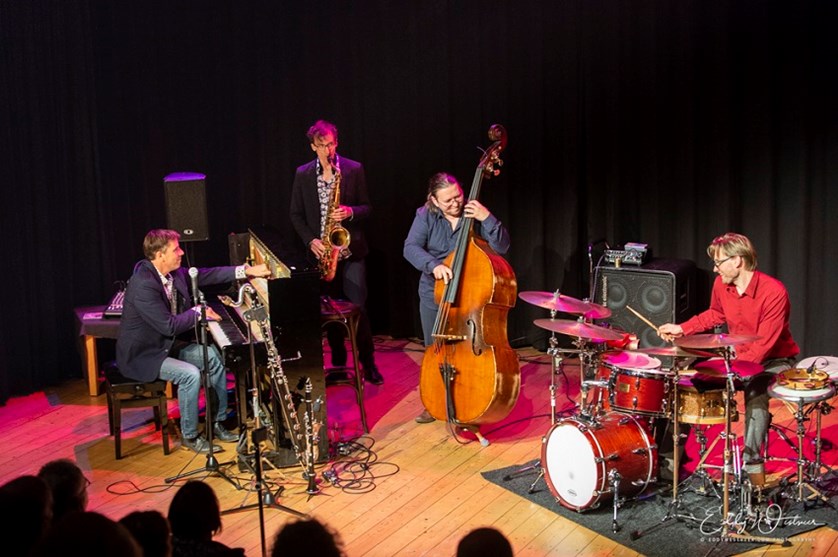
© Eddy Westveer
“classical music adepts hear the original somewhere,
the jazz audience listens open minded”
Pianist Paul Stark and drummer / percussionist Jonas Linnemann (the co-leaders of the Dutch formation StarkLinnemann) found their purpose in transforming classical masterpieces into jazz and hence created their own style which they describe as Universal Crossover Music (UCM). After Liszt (Sonata 2012), Chopin (three volumes, 2016), Mussorgsky ('Pictures at an Exhibition', 2019), Beethoven (two volumes, 2020), we are looking forward to the release of Beethoven's 'Eroica' and Transcending Liszt (ao 'Hungarian Rhapsody').
Due to the pandemic, all concerts were canceled and the releases were put on hold. A single livestream from Paradox Tilburg on March 19, 2021 brought StarkLinnemann to the stage once more. In these somewhat unreal times, we thought it was an excellent opportunity to approach them through a zoom conversation to get to know them better.
How did the spark arise to transform classical music into jazz?
Paul Stark: It came from the love I’ve always felt for both classical music and jazz. For me they are equivalent. Although I may come from a jazz background, I felt the urge to record a classically inspired album (‘Sonata’) back in 2010. This record is based on Franz Liszt’s Sonata in b minor, I have had been obsessed by this major classical piano work for many years prior to the idea of actually recording it. Arnoud Gerritse, the drummer on that recording who taught at the conservatory in Gent, suggested to record it at 'De Bijloke Studio’s ' in Gent (Belgium).
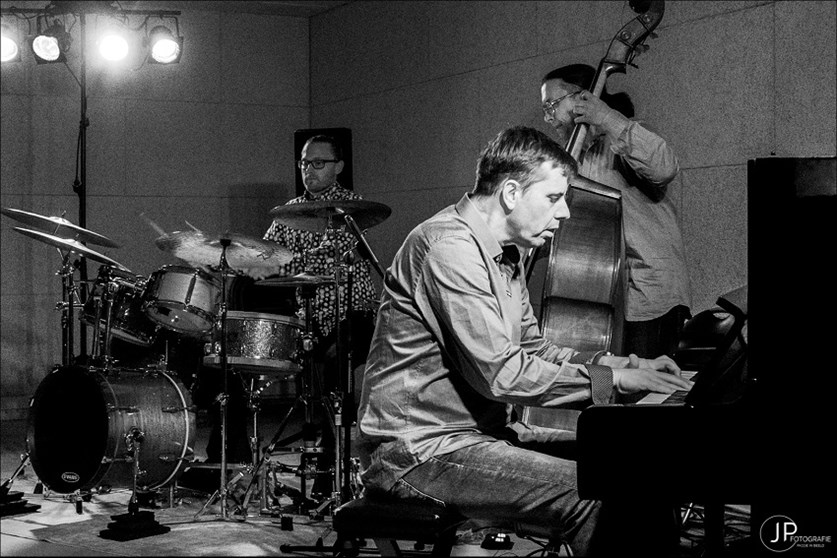
Live in Tilburg 2020 © Johan Pape
How did the collaboration with Jonas Linnemann come about?
Paul Stark: Jonas and I played together before but not yet as StarkLinnemann. We teamed up at the end of 2012 with the first CD, "Awake", which was also recorded at De Bijloke Studio’s. Jonas and I were responsible for the original compositions, tenor saxophonist Dick de Graaf, trumpet player Gerard Kleijn and bassist Vasilis Stefanopoulos played along in the StarkLinnemann Quintet.
What were you, Jonas, doing before you met Paul Stark?
Jonas Linnemann: I studied at the conservatory in Tilburg before moving to Rotterdam where I studied and taught jazz, especially percussion, congas, and Brazilian percussion. Rhythmically I feel strongly connected to African and South American music. In addition to jazz, Brazilian, and African percussion I studied classical percussion as well, including the complete range of instruments like timpani, marimba, etc..
I met Paul during jam sessions at Dizzy (jazz venue) in Rotterdam in 2010 and immediately there was a nice synergy between us. We were playing several styles back then from jazz to Brazilian music which took us in many different directions musically.
And when did you switch to the classical approach?
Paul Stark: I had classical piano lessons from various teachers for quite a few years in order to be as equally equipped as a classical concert pianist. By the way the Russian master pianist Misha Fomin is still one of my teachers. After planting the first seeds of converting classical masterpieces into music for jazztrio and jazz quartet it stil continues to grow the more time I spend on it.
‘Unraveling Time’ is one of our concepts for a concert whereby the audience hears the original classical piece performed by a classical musician prior to experiencing our version. We collaborated with Misha Fomin on a few occasions with music from Mussorgsky. With these concerts we want to bring classical music and jazz closer together and therefore enable audiences from both genres to really connect in a mutual experience.
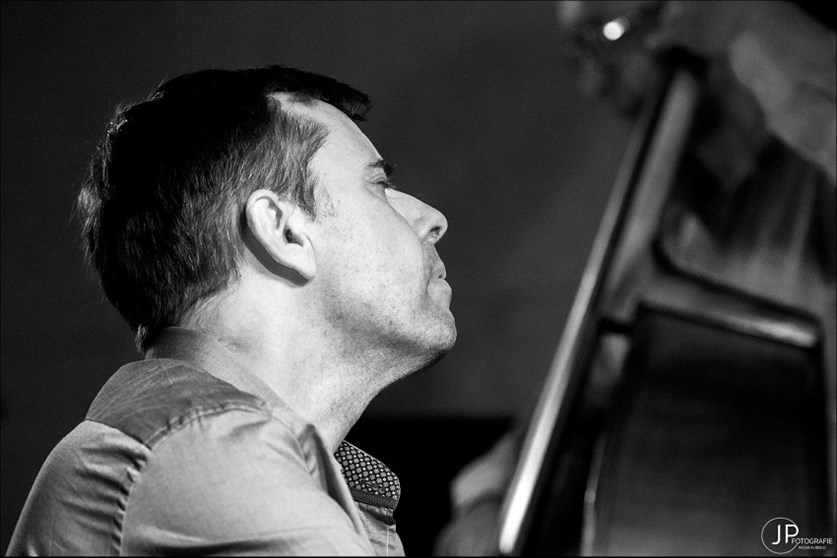
Paul Stark 2020 © Johan Pape
With StarkLinnemann you strive for a completely new structure / recomposition ...
Paul Stark: I start by playing a classical piece with the original score in order to get really familiar with the composer’s intentions. Then I let the jazz slip in as I feel the music myself during a gradual detachment process. After the score is recomposed the band gets together during rehearsals in our studio. And then many things can change. When a bass is added, it starts to sound fuller. The notes themselves remain intact, but the performance has changed completely. It is true that Jonas is also recomposing and helping to shape the music into our style.
Jonas Linnemann: As a group we make a lot of changes during the process. My main focus falls on the rhythm and adjustments in the bass lines. Ultimately the parts are rewritten to fit our own personal style. During these rehearsals we have a lot of discussion and exchange of ideas which eventually guides us to our finished work.
The classical masterpieces are unraveled and the improvisations increase the duration of the recomposition ...
Paul Stark: Yes, that often plays out twice as long. The original piano versions from ‘Liszt Sonata in b minor’ and ‘Pictures at an Exhibition’ take about half an hour, however we arrive at the coda in 50 minutes for Liszt and an hour and a half for Mussorgsky. A lot of styles and improvisations go in to our recompositions.
Jonas Linnemann: Especially during live performances where we have the opportunity to improvise even more. What we’re achieving with “transcending” is really a very personal reimagination of the classic masterpiece. The classic masterpiece forms the basis, but we give it our very own interpretation. I think for trained classical audiences, the originality of Chopin and Beethoven remains recognizable even as we have folded in our own StarkLinnemann style.
You could essentially forget it's from Liszt or Beethoven ...
Jonas Linnemann: I’d like to think so. If you don't know the original piece you may not immediately connect it to the classical work.
Paul Stark: In our versions I try to remain somewhat loyal to the composer. It can go in any direction, which is logical if you think in jazz forms. But I always maintain some respect for the composition.

© Eddy Westveer
How did you end up with saxophonist Iman Spaargaren?
Jonas Linnemann: For several years I played concert sessions in Nijmegen with many renowned jazz musicians in the Netherlands. There were also a few musicians from the UK including Nigel Hitchcock. I met Iman Spaargaren through these concert sessions. His open vision, conviction, passion, and complete dedication to the music stood out. Iman liked our approach to classical music and he and Paul clicked right away. When we got together for our first rehearsal I told him I hoped he would be playing our music by heart in two weeks time when we were set to enter the studio. At first I think he thought I was joking, but to his credit when we entered the Bauer Studios in Germany two weeks later he was all set.
Maciej Domaradzki has now taken the permanent place of the bass ...
Jonas Linnemann: We have worked with at least 20 different bass players prior to Maciej. It was not easy to find the right bass player for this project.
Paul Stark: Among those 20 bass players, even Joris Teepe played along. With our first quintet, Vasilis Stefanopoulos was the bass player, but he has taken a different direction. Maciej Domaradzki was already occasionally subbing for Vasilis, and I've known Maciej for a long time because he was involved with previous projects. For example, if you take Transcending Chopin, there is a lot of bowed bass (Arco) involved. Maciej shows himself masterfully in this skill. If you watch the live stream at Paradox on youtube, you see Maciej sparkle with the bow.
Is there anything fundamentally different with the new releases? Do you have any new ideas that you want to try out and / or tackle differently?
Jonas Linnemann: That's a good question. There is a bigger emphasis on the bowed bass in "Hungarian Rhapsody". We also try a little more in the direction of Brazilian rhythms combined with irregular time signatures. In the future we would also like to work with a guitarist on creating soundscapes.
Paul Stark: Each masterpiece requires a different approach from us, and therefore it is automatically different. On Beethoven’s "Eroica", we are going to collaborate with trombonist Vincent Veneman. How we approach it in the end will be more or less in the same line, although it always requires new perspectives.
Jonas Linnemann: The new Transcending Liszt project during corona gave me more time and space to go deeper and recompose all the parts for the trio. In addition to the surprising "Hungarian Rhapsody", there will be a special version of "Liebestraum", "Vallée d’Obermann”, and “Ave Maria". Liszt himself adapted the piano solo into a beautiful piece, but we are interpreting it very differently and giving it our own StarkLinnemann signature.
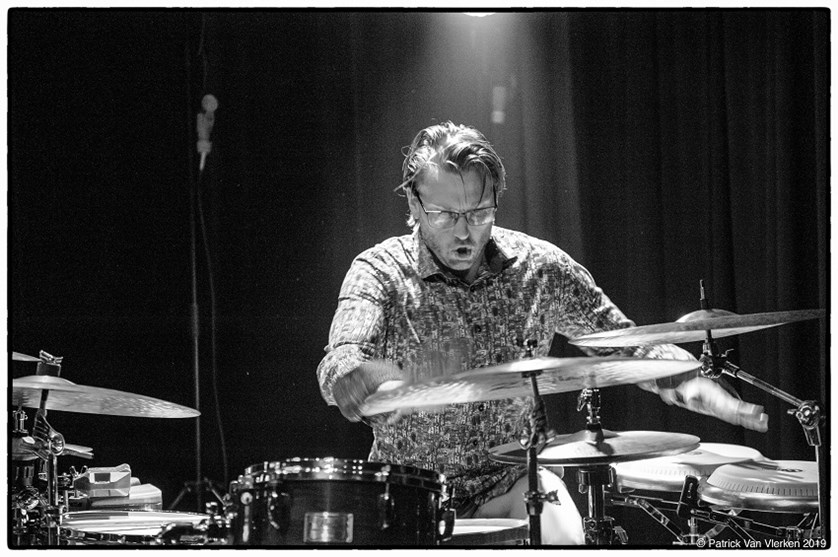
Jonas Linnemann © Patrick van Vlerken
What is fundamentally important in the choice of a classical piece? Already Liszt, Chopin, Mussorgsky and Beethoven… but no Mozart or Bach?
Paul Stark: Bach is on my list of nominations. I am still studying classical music and before I venture into Bach I want to go through a whole process. I think Bach’s music will be part of our repertoire one day. Mozart is something else, I don't feel as strong of a connection to his music.
Do you have an idea of how the classical world views your transcending projects?
Jonas Linnemann: We have received positive reviews from the classical music press, like from musicologist Olga de Kort about our project "Pictures at an Exhibition". And we have also performed on classical music stages, which hopefully the classical music audience has appreciated. Classical listeners are usually familiar with the original work so they are more aware of our transformations, where the jazz audience who may not know the original work tend to listen with a more open mind.
Paul Stark: I see that somewhat less positively than Jonas. Very classically oriented listeners find it interesting what we do, without question. But they clearly have reservations, for example the extended duration of the piece. Everyone has their own opinion about this. But I do think we make that connection.
Especially when we confront the audience with the classical version in relation to StarkLinnemann’s version. We are planing to work with the German-Canadian cellists Johannes Moser and the classical pianist Clara Biermasz from Vienna, that's also what “transcending" means to us.
Jonas Linnemann: While on the subject, we had a similar collaboration with cellist Pieter Wispelwey and pianist Paolo Giacometti for Chopin’s Cello Sonata.
By which jazz musicians are you especially being inspired?
Paul Stark: My first and still great example is Ahmad Jamal. He's played a major role for me in getting more freedom in musical structures. When you compose within a jazz idiom and especially for the trio, Jamal is much freer, it can go in all directions, his way of playing has also influenced me enormously. Every note counts. I am also a fan of Keith Jarrett, it’s impossible to ignore his influence on modern piano playing. Those are the two greats in my musical life.
Jonas Linnemann: For me it starts with Max Roach, who has also made beautiful solo albums. I transcribed a lot of his work while in college. Jack deJohnette is an absolute hero for the modern approach to the drums and I love his work with the Keith Jarrett Trio and Elvin Jones who are some of the greats. I have also been inspired by Bill Stewart, André "Dédé" Ceccarelli, and closer to home Hans van Oosterhout.
The Afro Cuban drumming style from Horacio “El Negro” Hernández and the Mexican conga player Poncho Sanchez have also been very influential to me. There are so many great drummers and percussionist all over the world that inspire me every day.
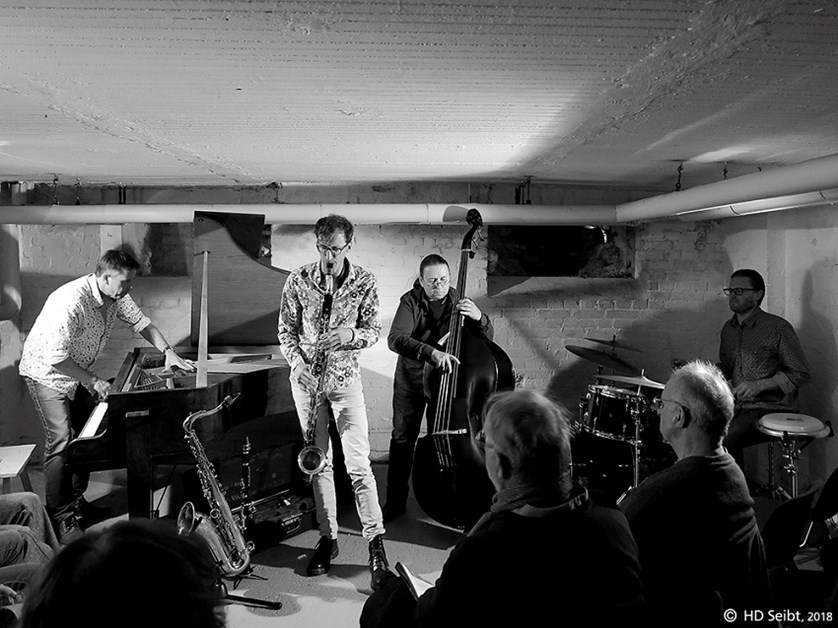
Live in Berlin 2018 © HDSeibt
What are the expectations, also internationally?
Paul Stark: The past year and a half has been like a rollercoaster, in terms of all the concerts that may or may not take place for us. The Liszt competition in Utrecht TivoliVredeburg dedicated to Beethoven and the Beethoven Festival were canceled. Scheduled performances in China in October 2020 and also in St. Petersburg were canceled due to the corona crisis and a performance in Brussels also has been postponed.
Just before the complete lockdown we were able to present the "Eroica" in Dordrecht. Of the 2 to 3 performances a week, zero have remained, only a livestream in Paradox Tilburg brought StarkLinnemann back to the stage.
Jonas Linnemann: What we hope for is once again presenting our new projects live with an audience even if that is on a small scale. I'd rather perform live in front of 20 people than a “live stream” with around 60 people watching from an electronic device.
These performances are an important outlet for us to sell our music. Beethoven Vol. 1 and 2 are deliberately not yet on Spotify. It is such a small market for us it makes little difference financially at this time whether we do or not.
Our ambition internationally is in line with previous tours such as Russia and France, but we are open to all of Europe and even Canada.
© Bernard Lefèvre, April 2021 (translated by Jonas Linnemann)
Other
In case you LIKE us, please click here:

Foto © Leentje Arnouts
"WAGON JAZZ"
cycle d’interviews réalisées
par Georges Tonla Briquet

our partners:



Hotel-Brasserie
Markt 2 - 8820 TORHOUT

Silvère Mansis
(10.9.1944 - 22.4.2018)
foto © Dirck Brysse

Rik Bevernage
(19.4.1954 - 6.3.2018)
foto © Stefe Jiroflée
Philippe Schoonbrood
(24.5.1957-30.5.2020)
foto © Dominique Houcmant

Claude Loxhay
(18/02/1947 – 02/11/2023)
foto © Marie Gilon

Pedro Soler
(08/06/1938 – 03/08/2024)
foto © Jacky Lepage
Special thanks to our photographers:
Petra Beckers
Ron Beenen
Annie Boedt
Klaas Boelen
Henning Bolte
Serge Braem
Cedric Craps
Luca A. d'Agostino
Christian Deblanc
Philippe De Cleen
Paul De Cloedt
Cindy De Kuyper
Koen Deleu
Ferdinand Dupuis-Panther
Anne Fishburn
Federico Garcia
Jeroen Goddemaer
Robert Hansenne
Serge Heimlich
Dominique Houcmant
Stefe Jiroflée
Herman Klaassen
Philippe Klein
Jos L. Knaepen
Tom Leentjes
Hugo Lefèvre
Jacky Lepage
Olivier Lestoquoit
Eric Malfait
Simas Martinonis
Nina Contini Melis
Anne Panther
France Paquay
Francesca Patella
Quentin Perot
Jean-Jacques Pussiau
Arnold Reyngoudt
Jean Schoubs
Willy Schuyten
Frank Tafuri
Jean-Pierre Tillaert
Tom Vanbesien
Jef Vandebroek
Geert Vandepoele
Guy Van de Poel
Cees van de Ven
Donata van de Ven
Harry van Kesteren
Geert Vanoverschelde
Roger Vantilt
Patrick Van Vlerken
Marie-Anne Ver Eecke
Karine Vergauwen
Frank Verlinden
Jan Vernieuwe
Anders Vranken
Didier Wagner
and to our writers:
Mischa Andriessen
Robin Arends
Marleen Arnouts
Werner Barth
José Bedeur
Henning Bolte
Erik Carrette
Danny De Bock
Denis Desassis
Pierre Dulieu
Ferdinand Dupuis-Panther
Federico Garcia
Paul Godderis
Stephen Godsall
Jean-Pierre Goffin
Claudy Jalet
Chris Joris
Bernard Lefèvre
Mathilde Löffler
Claude Loxhay
Ieva Pakalniškytė
Anne Panther
Etienne Payen
Quentin Perot
Jacques Prouvost
Renato Sclaunich
Yves « JB » Tassin
Herman te Loo
Eric Therer
Georges Tonla Briquet
Henri Vandenberghe
Peter Van De Vijvere
Iwein Van Malderen
Jan Van Stichel
Olivier Verhelst



